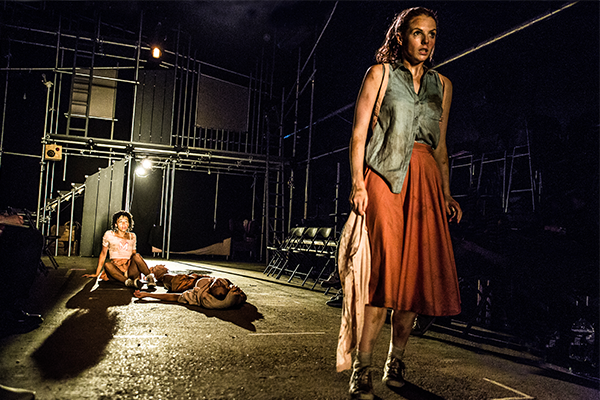
Last night brought Pawn the first performance of this trip; Karagula by Philip Ridley, at the new Styx performance space in Tottenham Hale.
I’ve long been fond of Ridley’s work, since seeing Pitchfork Disney at Arcola, back in 2012. That show has stuck with me ever since, and represents a high bar for any new work to overcome. Sadly, this latest from Ridley, Karagula, does not achieve escape velocity.
Last year Ridley’s Radiant Vermin, at Soho Theatre was a quirky & delightful treat, with strong performances, concise direction, a clean book, and good lighting. A highlight of that trip’s shows. In contrast, however, Karagula is quite simply a mess.

It should be a tip-off when all of the review quotes on the adverts use some version of the word “Ambitious.” That’s a good term for this sprawling Sci-Fi/Poli-Sci mashup which takes place in a galaxy far, far, away, in a time other than now (we think) and spans centuries. The dozens of characters are performed by just 9 actors, with varying degrees of success. The fault lies not with performances, however, but with the far-too-messy script and poorly executed technical aspects.
This show is 3 hours long, with a single interval. The entire theatre is rearranged during said interval, going from audience seated along the two long sides of the rectangular black-box space, to all seated along one short side.

The basically unadorned stage of the first half is supplanted in the second act by a cave set, in which the ceiling is represented by a patchwork of parachute fabric, coffee & tea stained in colour, held aloft by ropes. These ropes are affixed to the fabric by Velcro, to facilitate tear-away scene changes. Unfortunately, early in the action, a critical support tore away prematurely, leading to the collapse of one side of the drop, and flooding the audience with bright, white light from the back-lights. No effort was made to correct for this, leaving a blinded audience to squint at the rest of the scene.
There is much frenzied action during this play, which like most of its genre depends heavily on seemingly important exposition delivered in opaque language with unfamiliar or invented terminology. Unfortunately, in this case much of that is shouted, with or wihout amplification, with a very wearing result. By the time of the final scenes, Pawn found he just wanted it to be over, and was actively rooting for the doomsday device to be triggered.
Fans of Burgess, Orwell & Huxley will find many familiar themes here, from milkshakes to Marshalls, teachers to cheerleaders, oracles to animals. Little coherency binds them to the story, and one often might think they’ve napped through some vital section, but with no awareness of such nap.
You’ve let me down, Mr. Ridley. I do hope this show returns to workshop, however, and reëmerges some day, trimmer, sharper, quieter and more orderly.
